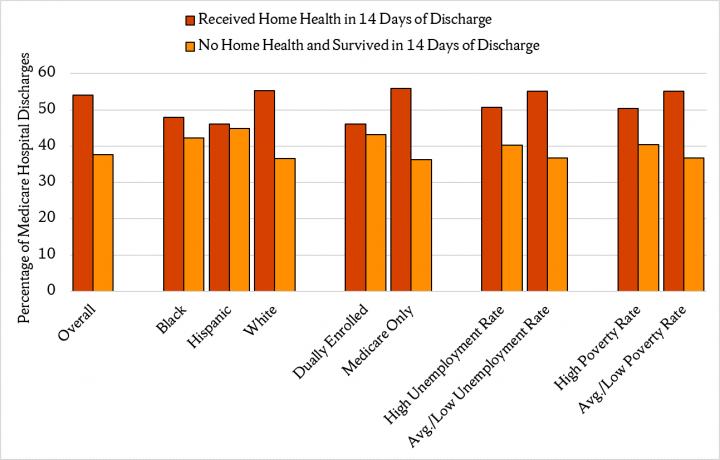
Credit: Data Source: Estimates are from “Assessment of Receipt of the First Home Health Care Visit After Hospital Discharge Among Older Adults, ” JAMA Network Open 3(9) :e2015470.
Syracuse, N.Y. – A study published today by the JAMA Network Open shows that in the period from October 2015 to September 2016 before the Affordable Care Act, a substantial portion of Medicare patients referred to home health care after hospitalization did not receive that care.
Using national data, the researchers detailed how often Medicare patients referred to home health care services after a hospital discharge received one or more home health care visits. They examined variation in the rates of successful home health care referrals by patient sociodemographic characteristics.
The study, “Assessment of Receipt of the First Home Health Care Visit After Hospital Discharge Among Older Adults,” was published today by the JAMA Network Open. Led by Syracuse University Professor Jun Li, the research team noted these key findings:
- Only 54 percent of Medicare patients referred to home health care services following a hospitalization received home health care visits.
- Black and Hispanic Medicare beneficiaries received home health at lower rates than White patients by 7.3 and 9.2 percentage points, respectively.
- Patients residing in disadvantaged neighborhoods – those in ZIP codes with high poverty and unemployment rates – received lower rates of home health care services by approximately 5 percentage points.
Home health care is one of the fastest-growing services used by patients following a hospital stay in the U.S. Patients receive health and social services within their homes to help them recover from illness or injury and to maintain their independence. Ensuring access to home health care has important implications for patient wellbeing and the U.S. health care system.
The study examines recent years since the implementation of the Affordable Care Act. The research team includes Jun Li, an assistant professor of Public Administration and International Affairs at the Syracuse University Maxwell School of Citizenship and Public Affairs, a faculty associate in the Aging Studies Institute, and a faculty affiliate in the Center for Aging and Policy Studies; Mingyu Qi, a statistical analyst at the University Pennsylvania Perelman School of Medicine; and Rachel M. Werner, a professor of medicine at the University of Pennsylvania Perelman School of Medicine and the Robert D. Eilers Professor of Health Care Management at the Wharton School, and the Executive Director of the Leonard Davis Institute of Health Economics.
This study indicates that despite the benefits of home health care, nearly half of the discharged patients are unlikely to receive it. The findings suggest patients in vulnerable population groups are more likely to face consequential barriers to home health care. These disparities are doubtlessly contributing to the inequitable health care system in the U.S.
“Recent health care reform efforts increasingly rely on home health care as a substitute for institutional care,” Li said. “With this knowledge, policymakers should implement a system that ensures all patients receive the home health care that has been recommended by their physicians.”
###
Media Contact
Matthew Michael
[email protected]




